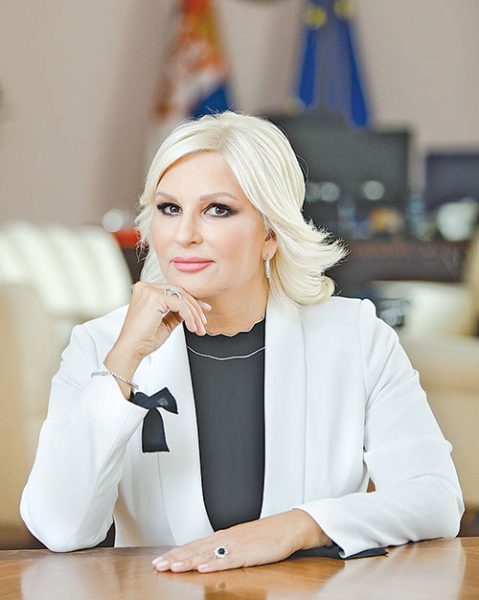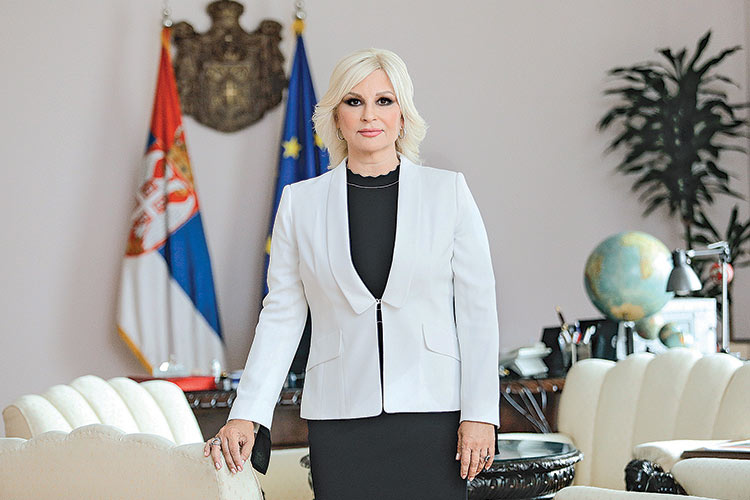Energy transition is a process that represents the reality for the whole of Europe, including us. The Green Agenda gives us the opportunity to convert that reality into a growth model and to emerge from the energy transition as winners, with new investments, technologies and jobs, but also with a clean environment. We are preparing seriously for this huge job.
The energy sector finds itself in a period of great changes, not only in Europe, but around the whole world. The engine for these changes is investment, and Serbia – as a country – is already overdue in that, and we will pay for any further delays by being left behind, not only in the energy sector, but also in economic development, considers Serbian Deputy Prime Minister and Minister of Mining and Energy Zorana Mihajlović Ph.D.
Changes in energy do not occur overnight, but rather must be planned over the long term. If we want to realise our vision of a green Serbia, if we want to generate 50 per cent of our energy from RES by 2050, we must start working on that vision today. That’s why this year is a breaking point in the development of energy, insists our interlocutor.
The ministry has adopted four new laws in order to create a favourable framework for investment, and prepared a new investment plan that encompasses new priorities in energy policy. Alongside this, work has also begun on the preparation of the most important strategic documents, the Energy Development Strategy and the Integrated National and Climate Plan, which will determine the goals and path of our development until 2050. The Ministry’s plan is for the drafting of both documents to be completed by this November and for them to be adopted and work commenced on their implementation during next year.
How limiting is it for Serbia that European financial institutions no longer intend to invest in energy plants based on the use of coal?
The reason why financial institutions don’t have an interest in investing in such plants lies precisely in the energy transition process and the green agenda, as well as the fact that new thermal power plants would be economically unprofitable, due to carbon taxes that are only set to increase in the future. Of course, this doesn’t mean that we don’t need to invest in reducing the harmful impact on the environment caused by existing thermal power plants, which we are doing, actually with the support of international creditors.
The energy mix will certainly look different in the decades ahead than it looks today, when Serbia receives two thirds of its electricity from coal, but this process will unfold gradually and according to plan, with the brunt of the work focused primarily on building new energy capacities.
If we want to achieve our vision of a green Serbia, if we want to generate 50 per cent of our energy from RES by 2050, we must start working on that vision today
When it comes to renewable forms of energy, which sectors attract the attention of foreign investors?
During previous years, the biggest investments in the field of renewable energy sources (RES) have been in the construction of wind farms, so that today we have close to 400 MW generated from this source on the network, as well as another 168 MW under construction. However, Serbia is also rich in other potentials when it comes to RES, and we believe that, with the new Law on the Use of RES, we will soon see not only new wind farms, but also more investments in the use of solar energy, biomass, new biogas power plants etc.
In the new investment plan, which is worth a total of 17 billion euros, RES occupy an important place, primarily in terms of projects in the fields of solar and wind energy. Projects in the field of solar and wind energy have a potential value exceeding five billion euros, and these are primarily projects intended for the private sector.
Which remaining institutional obstacles should be removed in order for this sector to be attractive for investment?
With the adopting of four new laws in the field of energy and mining, this sector has been fully opened to new investments.

This relates particularly to the domain of RES, which has been regulated by a special law for the first time. This new law introduces market premiums instead of the pre-existing feed-in tariffs, which are only retained for small plants and demonstration projects, in accordance with the rules on state aid that are applicable in the EU.
Moreover, the buyer-producer institute has been introduced through the new law and is focused on the production of electricity from RES to cater for one’s own needs. This means, for example, that citizens will be able to produce electricity from solar panels when there is the most sunlight, to deliver that amount of energy to the system, and then consume it during the evening hours. If they generate more than they use during that month, they can use the surplus during the following month.
We will also support them in that with subsidies, based on the same model as the one used for the energy rehabilitation programme, where the Ministry and local governments co-finance the investment with 25 per cent each, while the citizens account for the remaining 50 per cent themselves. The first public call for the co-financing of solar panels will be announced in early September.
There is evident interest in Serbia accelerating the digital transformation process. What, in this context, are your priorities for the energy and mining sectors?
We’ve seen the extent to which the introduction of e-permits had a positive impact on the overall business environment, and our wish was to transfer that experience to the energy and mining sector. One of the new additions in the adopted laws is the digitalisation of procedures for issuing various permits and approvals, through e-mining and e-energy reforms.
On the one hand, Serbia is an attractive market for companies that deal in the exploitation of mineral resources, while on the other hand, countries wanting to continue integrating into Europe must respect the environmental protection rules prescribed by the EU. How much, in that sense, will Serbia succeed in adhering to these standards?
I don’t see these things as being contradictory. On the contrary, any project in the field of mining in Serbia can only be implemented if all requirements related to environmental protection are met. That’s because mining isn’t only the extraction and processing of mineral ore, but also taking care of the people who live next to the mine and taking care of nature.
Mining also has great development potential, because confirmed mineral reserves in Serbia have a value of around 200 billion dollars. By adopting amendments to the Law on Mining and Geological Research, we’ve enabled the efficient and sustainable use of these resources, which implies adherence to the highest standards of environmental protection.
Projects in the field of solar and wind energy have a potential value exceeding five billion euros, and these are primarily projects intended for the private sector
We believe that, with the new investments, mining’s contribution to GDP could double over the following few years, from the current 1.9 per cent to 3.5 to four per cent of GDP. However, that’s not the only goal, rather we are also striving to have the best mining practises, through cooperation with the world’s largest companies, and that means sustainable and green mining. The first green mine in Serbia will be the Čukaru Peki mine, which should open this autumn and where trial production has already begun.
I believe that Serbia’s future lies in sustainable, green mining that contributes to economic growth, but which also undeniably implies the highest standards of environmental protection, and that will be our demand for all mining companies and all new projects. On the other hand, we must fight to combat various untruths that are appearing linked to mining projects, which we’ve seen the most with the example of the “Jadar” project.
The energy sector is fertile ground for the application of artificial intelligence, machine learning and innovation. When it comes to this area, how much can Serbia rely on its own academic and innovation potentials?
All countries that have a developed energy sector didn’t achieve such a sector thanks only to their natural resources, but also through the development and utilisation of a resource without which there can be no development, and that is knowledge. That was as true in the past as it is today, when the entire world is going through an energy transition process and will increasingly rely on RES and, in the future, also on hydrogen.

The Ministry is open to cooperation with everyone who is able to help with their knowledge and experience, and we’ve also already signed cooperation agreements with several professional associations, which will work together with us on the drafting of the most important strategic documents. I likewise believe that the new investment cycle provides an opportunity for our engineers, who will gain the opportunity to work on new projects, because we are awaited by the construction of new hydropower plants, gas power plants, new capacities that use RES, as well as the first steps in the development of hydrogen technology, which will form a special part of the Energy Development Strategy.
During your term as construction minister, you’ve achieved great success in terms of increasing Serbia’s rating on the Doing Business list, while working closely with private sector players that have expertise in this area, such as the companies gathered in the FIC. Which topics are in the focus of your work today when it comes to improving the business climate?
We’ve been working for a long time with business associations and international financial institutions to improve the business environment, and the greatest success is undoubtedly the introduction of e-permits, thanks to which Serbia is today ranked 9th in the world for this criterion on the World Bank’s Doing Business list. With this reform, we initiated, or unblocked, many investments and construction projects, thus contributing to higher economic growth.
When it comes to the energy department, our goal is to utilise the model of e-permits to fully digitalise procedures in the energy sector, but also to improve the efficiency of procedures for obtaining connections to the electricity network. According to World Bank analyses, completing this procedure currently takes 125 days, while our goal is for this procedure to take a maximum of 50 days, and we will work on that together with Elektrodistriubucija Srbije.
| STANDARDS I believe that Serbia’s future lies in sustainable, green mining that contributes to economic growth, but which also undeniably implies the highest standards of environmental protection | INVESTMENTS Serbia is already late when it comes to investment in the energy sector, and we will pay for any further delays by being left behind, not only in the energy sector, but also in economic development | COOPERATION Work with business associations and international financial institutions to improve the business environment has already brought us a significantly better rating |
|---|